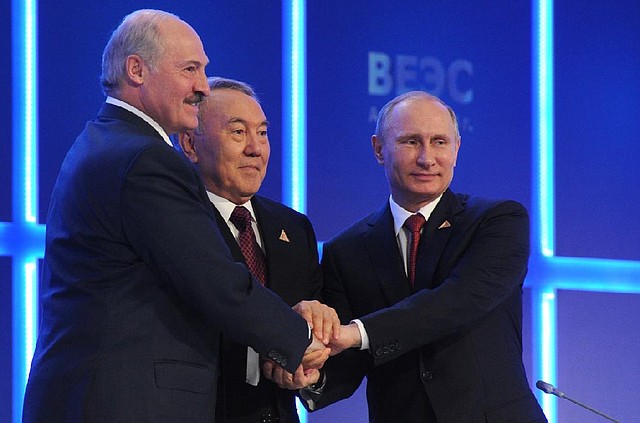Russia, two allies form economic union
Presidents Alexander Lukashenko of Belarus (from left), Nursultan Nazarbayev of Kazakhstan and Vladimir Putin of Russia join hands Thursday after signing an economic agreement in Astana, Kazakhstan.
Friday, May 30, 2014
ASTANA, Kazakhstan — The presidents of Russia, Kazakhstan and Belarus formally signed an agreement Thursday to create a limited economic union — an alliance hobbled by the absence of Ukraine but one long pursued by President Vladimir Putin of Russia to confirm his country as a global economic force.
RELATED ARTICLE
http://www.arkansas…">12 Ukrainians die in downed copter
“Today we are creating a powerful, attractive center of economic development, a big regional market that unites more than 170 million people,” Putin said during the ceremonies. He underscored the significant energy resources, workforce and cultural heritage of the combined nations.
The geography of the group, formally known as the Eurasian Economic Union, means it has the potential to create a global transportation hub joining the trade flows of Europe and Asia, Putin said, sitting at a table with his two fellow leaders in front of their respective flags.
Others, however, did not share his enthusiasm.
“Three weak economies getting together and integrating, how much good can come out of it?” said Nargis Kassenova, the director of the Central Asian Studies Center at Kimep University in Almaty, Kazakhstan, and part of a small but vocal opposition to the union in Kazakhstan. “Now it is even worse because one is under sanctions and drifting away from the West,” she added, referring to Western economic sanctions against Russia over the Ukrainian crisis.
The missing guest at the party was Ukraine. The previous government in Kiev wavered back and forth on whether it would join the European Union or the new Eurasian group, eventually prompting enough public anger to topple the president in February.
“We lost someone along the way, I mean Ukraine,” said President Alexander Lukashenko of Belarus.
Lukashenko, who received a $2 billion loan and energy concessions from Russia just before the signing, also said the union was less than anticipated. “Unfortunately, it is not the agreement that our partners originally announced,” he told Belta, the official Belarus news agency.
He also called for economic unity to be followed by political and military unity, a concept that Kazakhstan flatly rejected.
“We are not creating a political organization; we are forming a purely economic union,” Bakytzhan Sagintayev, Kazakhstan’s first deputy prime minister and lead negotiator, said in an interview. “It is a pragmatic means to get benefits. We don’t meddle into what Russia is doing politically, and they cannot tell us what foreign policy to pursue.”
The agreement coalesced with great fanfare — and quickly, with members changing trade laws in a matter of years that required decades for the EU. But in the end it became less about promoting economic development than providing Russia with a diplomatic victory, analysts said.
Some analysts suggested that the loss of Ukraine as a potential member was the death knell for the Eurasian Economic Union. Losing Ukraine meant losing a market of nearly 50 million people and economic diversity, they said.
But more important, Russia’s military intervention in Ukraine has spooked the other members. At the last moment, some senior figures questioned the idea of the union.
“We cannot be in a union with an occupying state,” Oraz Jandosov, a former Kazakh central bank governor and finance minister, said in a March interview with the website Ratel.su. He fretted about Western economic sanctions on Russia reverberating through the Kazakh economy.
Kazakhstan also felt vulnerable in particular because one-quarter of its population are ethnic Russians, concentrated along the northern border. In defending their actions in Ukraine, Putin and other senior figures stressed that Russia felt it had the right to safeguard the 25 million ethnic Russians outside its borders.
Russia proposed several attributes for the Eurasian Economic Union that mirrored the EU, including a common passport and currency, a collective parliament, a common border force and a common economic foreign policy. But Kazakhstan applied the brakes to anything other than economic ties.
The speeches Thursday glossed over such differences.
“Russia, Belarus and Kazakhstan are moving toward a completely new level of cooperation by creating a common space where goods, services, capital and workforce can move freely,” Putin said. “The three states will follow a coordinated policy in such key branches of the economy as energy, industry, agriculture and transport.”
Putin suggested the wider world was already enthusiastic.
“We are forming a major market of 170 million people with huge industrial, scientific and technical potential, with colossal natural resources,” he said. “Wherever I go and whomever I meet, everyone wants to know how to establish relations with the new Eurasian Union.”
Information for this article was contributed by Alexandra Odynova of The New York Times.
